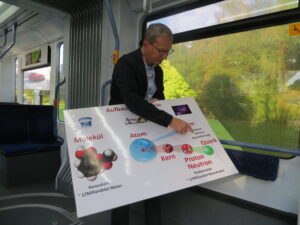27 September 2022
 We congratulate Ms. Bianca Savino on completing her dissertation titled
We congratulate Ms. Bianca Savino on completing her dissertation titled
"Development of Λ baryons reconstruction and its application to the search for a stable hexaquark at Belle II"
This thesis focuses on the search for a hypothetical particle composed of six quarks in the context of the particle physics experiment Belle II in Japan. The possible existence of such a state would help us to better understand the behaviour of matter under extreme circumstances.
The work can be divided into two main parts: the optimization of the Belle II software deployed in the reconstruction of tracks originating far from the main interaction point; and the subsequent sensitivity study for the search for the six-quark state, heavily relying on such tracks.


 The Institute of Nuclear Physics is taking part in the Mainz Science Week! During a guided tour on 17.09.22 you will have the opportunity to experience the Mainz Microtron MAMI, an electron accelerator, on the JGU campus. We will show you the path the electrons take through the accelerator from their generation to the various experiments, explain the principle of a racetrack microtron and give you an insight into the experiments we use for our research.
The Institute of Nuclear Physics is taking part in the Mainz Science Week! During a guided tour on 17.09.22 you will have the opportunity to experience the Mainz Microtron MAMI, an electron accelerator, on the JGU campus. We will show you the path the electrons take through the accelerator from their generation to the various experiments, explain the principle of a racetrack microtron and give you an insight into the experiments we use for our research. To perform research at the frontier of knowledge, it is necessary to have excellent scientists and an extensive technical infrastructure with well-trained specialists. For this reason, the Institute for Nuclear Physics has, for many years, provided training for young people in technical and mechanical professions, such as IT specialists.
To perform research at the frontier of knowledge, it is necessary to have excellent scientists and an extensive technical infrastructure with well-trained specialists. For this reason, the Institute for Nuclear Physics has, for many years, provided training for young people in technical and mechanical professions, such as IT specialists.
 We congratulate Dr. Matthias Heller on completing his dissertation titled
We congratulate Dr. Matthias Heller on completing his dissertation titled We congratulate Dr. Daniel Alberto Stanischesk Molnar on completing his dissertation titled
We congratulate Dr. Daniel Alberto Stanischesk Molnar on completing his dissertation titled

